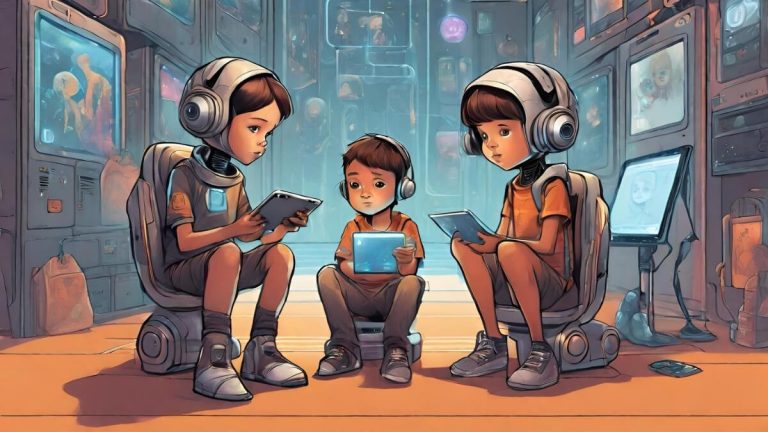Artificial Intelligence in Education: The Future of Early Childhood Education


In recent years, the integration of Artificial Intelligence (AI) in various industries has been transformative, and the field of education is no exception. The application of AI in education, particularly in early childhood education, holds great promise for shaping the future of learning.
This article delves into the ways AI is revolutionizing the educational landscape for young minds, exploring its benefits, challenges, and the potential it brings to create a more personalized and effective learning experience.
Related Reading: Benefits of Early Childhood Education & Effects on Future Success
AI encompasses a range of technologies that enable machines to simulate human intelligence, including learning, problem-solving, and decision-making. In the context of early childhood education, AI is employed to enhance the learning journey of young students, providing tailored experiences that cater to individual needs and learning styles.
Related Reading: AI for Kids: Exploring the Safety of Chat GPT for Children’s Use
One of the primary advantages of integrating AI in early childhood education is the ability to create personalized learning paths for each student. AI algorithms analyze individual strengths, weaknesses, and preferences, allowing educators to tailor lessons that resonate with each child. This personalized approach fosters a more engaging and effective learning environment.
AI facilitates the development of interactive and immersive learning experiences. Through the use of educational software and applications powered by AI, young learners can engage with content in a more dynamic and captivating manner. Interactive simulations and virtual reality tools provide hands-on experiences, making learning both enjoyable and effective.
While the potential benefits of AI in early childhood education are vast, it’s essential to address the challenges and considerations associated with its implementation.
The use of AI in education raises ethical concerns, particularly regarding data privacy. Collecting and analyzing student data to personalize learning experiences must be done with strict adherence to privacy regulations. It’s crucial to strike a balance between enhancing education and safeguarding sensitive information.
AI’s role in education prompts reflection on the dynamics between teachers and students. Striking the right balance between technology-driven learning and maintaining the human connection between educators and students is essential. AI should complement, not replace, the vital role of teachers in nurturing young minds.
As we navigate the integration of AI in early childhood education, it’s crucial to view AI as a facilitator rather than a replacement for traditional teaching methods.
Educators can leverage AI tools to streamline administrative tasks, allowing them to focus more on individualized instruction and mentorship. AI can automate grading, track student progress, and provide valuable insights, enabling teachers to devote more time to fostering creativity and critical thinking.
AI-driven assessments offer real-time feedback on student performance. These adaptive assessments adapt to each student’s learning pace, identifying areas that require improvement and providing targeted interventions. This ensures that educators can address challenges promptly, fostering a more effective learning journey.
As we envision the future of early childhood education, it’s clear that AI will play a pivotal role in shaping learning environments.
AI’s ability to adapt and evolve aligns seamlessly with the concept of lifelong learning. Early exposure to AI-driven education equips young learners with the skills necessary for an ever-changing job market. This includes critical thinking, problem-solving, and digital literacy skills that are essential in the 21st century.
AI has the potential to bridge the gap in educational accessibility. Through online platforms powered by AI, children worldwide can access quality education, overcoming geographical barriers. This democratization of education ensures that every child has the opportunity to unlock their full potential.
The integration of Artificial Intelligence in early childhood education marks a transformative shift in the way we approach learning. The potential benefits, including personalized learning paths, interactive experiences, and enhanced teacher support, are substantial.
However, it is crucial to navigate the challenges thoughtfully, ensuring that ethical considerations, data privacy, and the preservation of the teacher-student relationship are prioritized.
AI in early childhood education must adhere to stringent privacy regulations. Encryption, anonymization, and secure data storage are employed to safeguard sensitive student information.
No, AI should be viewed as a facilitator, enhancing traditional teaching methods rather than replacing them. The human connection between educators and students remains paramount.
AI-driven learning environments focus on fostering critical thinking, problem-solving, and digital literacy skills, preparing young learners for the demands of the 21st-century job market.
Yes, concerns exist regarding overreliance on AI. Striking a balance between technology-driven learning and maintaining the human element is crucial for a well-rounded education.
AI enables the creation of online platforms that offer quality education, ensuring that children worldwide can access learning opportunities, irrespective of geographical limitations.
References:

Get Your Resources to Your Email Now!
Comment (1)
Chioma Umunna
Thanks.
Do IA have emotions?